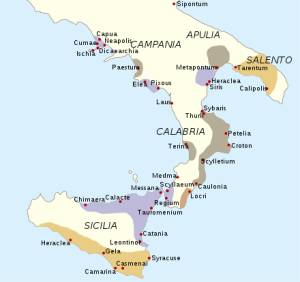Charles Atlas
Magna Graecia *
Magna Graecia is the term applied to those parts of southern Italy and  Sicily that were colonised by the Greeks, beginning as early as the 8th century BC. An interesting fact is that Philo of Alexandria (20 BC-50 AD) in his On the Eternity of the World(b) wrote “Are you ignorant of the celebrated account which is given of that most sacred Sicilian strait, which in old times joined Sicily to the continent of Italy?” (v.139). The name ‘Italy’ was normally used in ancient times to describe the southern part of the peninsula(d). Some commentators think that Philo was quoting Theophrastus, Aristotle’s successor. This would push the custom of referring to Italy as a ‘continent’ back to the time of Plato. More recently, Armin Wolf (1935- ), the German historian, when writing about Scheria relates(a) that “Even today, when people from Sicily go to Calabria (southern Italy) they say they are going to the “continente.” This continuing usage is confirmed by a current travel site(c). I suggest that Plato used the term in a similar fashion and can be seen as offering a more rational explanation for the use of the word ‘continent’ in Timaeus 25a, adding to the idea of Atlantis in the Central Mediterranean.
Sicily that were colonised by the Greeks, beginning as early as the 8th century BC. An interesting fact is that Philo of Alexandria (20 BC-50 AD) in his On the Eternity of the World(b) wrote “Are you ignorant of the celebrated account which is given of that most sacred Sicilian strait, which in old times joined Sicily to the continent of Italy?” (v.139). The name ‘Italy’ was normally used in ancient times to describe the southern part of the peninsula(d). Some commentators think that Philo was quoting Theophrastus, Aristotle’s successor. This would push the custom of referring to Italy as a ‘continent’ back to the time of Plato. More recently, Armin Wolf (1935- ), the German historian, when writing about Scheria relates(a) that “Even today, when people from Sicily go to Calabria (southern Italy) they say they are going to the “continente.” This continuing usage is confirmed by a current travel site(c). I suggest that Plato used the term in a similar fashion and can be seen as offering a more rational explanation for the use of the word ‘continent’ in Timaeus 25a, adding to the idea of Atlantis in the Central Mediterranean.
Giuseppe Palermo in his 2012 book Atlantide degli italiani is now bravely promoting the idea that Plato’s Atlantis was originally located beneath the town of Acri and the surrounding region of Calabria. He supports his claim by matching measurements provided by Plato with physical features around Acri(e). However surprising this idea may seem, it should be pointed out that according to Plato, Atlanteans had occupied southern Italy as far north as Tyrrhenia (Timaeus 25b & Critias 114c). If all this is not true, as a second prize, Acri can at least claim to be the birthplace of the famous American bodybuilder, Charles Atlas!
The Greeks began their gradual expansion westward between the 9th and 6th centuries BC, a development clearly illustrated on an excellent series of online maps(h). Understandably, they would have taken the shortest route from the Greek mainland to the heel of Italy and later on to Sicily. As they progressed with their colonisation new limits were set, and in time, exceeded. I suggest that these limits were each in turn designated the ‘Pillars of Heracles’ as they expanded. I speculate that Capo Colonna (Cape of the Column) in Calabria may have been one of those boundaries. Interestingly, 18th-century maps show up to five islands near the cape that are no longer visible(g), suggesting the possibility that in ancient times they could have been even more extensive, creating a strait that might have matched Plato’s description. On the other hand, the Strait of Messina was one of the locations recorded as the site of the ‘Pillars’ and considering that mariners at that time preferred to hug the coast, I would opt for the Strait of Messina rather than the more frequently proposed Strait of Sicily. A strait is defined as a narrow sea passage, a description that seems inappropriate for the 96 miles that separate Sicily from Tunisia.
For a brief history of the rise and fall of Magna Graecia, have a look at the classical wisdom website(f).
It is also noteworthy that there are a number of towns in Calabria where ancient Greek is still spoken(i). Similarly, back on the Peloponnese, the language of Sparta, Tsakonika, is still spoken by about 2,000 people in an area limited to 13 towns, villages and hamlets located around the village of Pera Melana(j).
(a) Wayback Machine (archive.org)
(b) http://www.earlychristianwritings.com/yonge/book35.html
(c) Four Ways to Do Sicily – Articles – Departures (archive.org)
(d) https://profilbaru.com/article/Name_of_Italy *
(e) https://www.atlantid.info/?page_id=539
(f) See: https://web.archive.org/web/20180824200049/https://classicalwisdom.com/magna-graecia-greater-greece/
(g) https://www.academia.edu/1152285/Discovery_of_Ancient_Harbour_Structures_in_Calabria_Italy_and_Implications_for_the_Interpretation_of_Nearby_Sites
(h) See: https://web.archive.org/web/20141105204103/https://learningobjects.wesleyan.edu/greek_colonies/
(i) http://www.madeinsouthitalytoday.com/mysterios-places.php
(j) BBC – Travel – The last speakers of ancient Sparta
